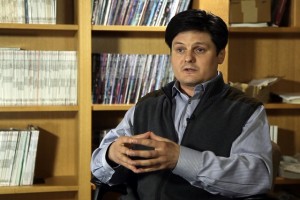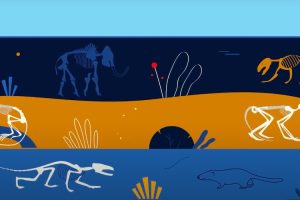Mutation, Selection and Genetic Drift
Biologist Shamil Sunyaev on the sources of genetic variance, reconstructing population history, and disease ri...
Many years ago I was in a bookshop in Athens. It was an old bookshop, a very beautiful one, which sold secondhand books. I was in Greece on holiday, and it was hot and there were crowds outside, so I went inside this bookshop. It wasn’t very useful: all the books were in Greek, but there were a few that were in English and among them were the collected works of Aristotle translated into English, by Oxford University Press, published at the beginning of the 20th century. I wasn’t very interested, being a scientist and not a philosopher. I knew vaguely about Aristotle. But one of the books caught my eye and it was this one here: it was called Historia Animālium, ‘The history of animals’. And I’m a zoologist, so I thought – ‘Oh, animals! How nice!’ And I opened it up and I began to read, and here’s the thing that amazed me: I read about the internal anatomy of snails, and the organs, the digestive glands, the oesophagus, he describes it all in detail, and this is exactly as I knew it, as I’d learned it when I was an undergraduate. It was wonderful! I had no idea that Aristotle knew this. He as it was spoke to me across 2,500 years.
So Aristotle is, let’s say, 37 or so at the time; he’s just gone across the Aegean, he left Plato’s Academy, the years around 345 BC, and he’s just married. We think that is his wife was very young, and the reason we think so is because he says in one of his works: ‘The best age for a man to marry is 37’, and we know he was 37 at the time. ‘The best age for a woman to marry is 18’, so we’re guessing that she was 18. He’s a great man for rationalizing everything. And then he goes to Lesbos, probably to this lagoon, and for the very first time in history he begins asking about the biological world. He picks up a snail, he opens it up and he asks for the very first time what’s inside. It’s not that people haven’t cracked open snails but they have done that to eat them. And he begins to accumulate all the information about the biology from hunters, fishermen, farmers wherever he can get the information from, and he starts sorting it out. He puts it in this book.
He doesn’t just write one book about animals: this is the very first one. In fact, he writes over the course of his life eight or nine of them and they are a complete science of biology. Historia Animālium, the book that I’ve picked up, the first, it’s not a Natural history, it’s not an encyclopedia full of silly stories like Pliny wrote, the Roman. Instead, it’s a database, it’s a way to take all this information, array it out, sort it out so that he can use it, see the patterns that then become the target for explanations in the rest of his books. For instance, he has a book called Parts of Animals in which he describes the relationships between parts and why creatures have the parts they do, why birds have certain kinds of beaks and why birds with long thin beaks have long legs (because they have to walk through water and use their beaks) and why other birds have talons and hooked-nosed bills, like a hawk or an eagle and so on and so on and so on. He describes all this in great detail. It seems actually all very Darwinian; it’s not though.
And then he has another book on the locomotion of animals: he explains how they walk in the light of his physics. He has books about the biochemistry, what we would now call the biochemistry of creatures, about how they keep themselves alive, about their internal fire: it’s an entire physiological description. He’s sort of a one-man biology department. And then we have his greatest book, his most brilliant book which is the Generation of animals. In the Generation of animals he opens for the very first time a chicken egg and watches a chick lying there on its bed of albumin with its little heart beating and describes how it changes over the course of time to develop into a chicken, ‘to come into being’ as Aristotle says. It’s the first time that anybody ever does that.
It is a magnificent accomplishment, although it’s difficult to evaluate in some ways. So many of the specifics are wrong! Aristotle’s physics was wrong, his chemistry runs on four elements, so how he thinks animals would walk doesn’t entirely make sense because if your underlying mechanics isn’t right and if your chemistry runs on four elements then your physiology can’t be that good. And yet, and yet it is so brilliant and so illuminating! You can trace through ideas from Aristotle that shape our entire field even though we do not know it. His thought is like a subterranean river that surfaces now and then and influences us even though we don’t even know it. He gave us the very structure of our thought.
One of my favourite ideas, and it’s one of his most important ideas, for example, is his idea of the soul, the ψῡχή (psukhḗ, ‘psyche’). He was not the first person to write about the soul: Plato did, Homer used the term ψῡχή, and of course, we’ve used it ever since. But Aristotle’s soul is not our soul, it’s not the Judeo-Christian soul: you mustn’t imagine it as being some sort of mystical entity that is to do with our religious beliefs. Not at all. Aristotle is very clear: the soul of an animal is the principle, the thing that keeps any creature alive, and when an animal dies its soul dies with it, or better yet, when its soul falls apart an animal dies. What is this thing? I think it is what we would now call the interrelation of parts that are responsible for life itself, it is the system that keeps a creature alive. That is why, for instance, I would argue that Aristotle is the very first systems biologist.
Modern scholars call that passage (which I’ve misquoted a little bit, but I’ve got the essence of it), the invitation to biology. It was the first time that anybody ever said it.

Biologist Shamil Sunyaev on the sources of genetic variance, reconstructing population history, and disease ri...

Bioinformatician Manja Marz on non-coding RNAs, the dynamic programming approach, and homology search

Research team discovered that 35 million years ago the ancestors of hippos were among the first large mammals ...